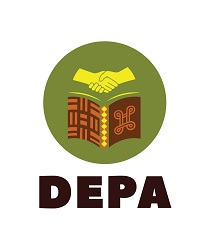The project has resulted in a range of diverse educational resources, including music clips, melodies, podcasts, animations, and academic literature. These resources include the following open educational resources that communicate cultural heritage:
- Traditional melodies from Beni Maouche, a Kabyle-speaking commune in northern Algeria in the Béjaïa Province.
- Here is a short podcast of the upcoming work: Amammalandalyas, a traditional legend from the Tuareg community in the Tamanrasset region.
- A sand animation clip narrating the 'Amammalandalyas' story is being produced to cater to both auditory and visual learners. Subtitles will be available in both Arabic and English upon final production. The legend exhibits core values for peace and conflict resolution and leadership, including critical thinking, bravery, respect for life, intelligence, perseverance, wisdom and resourcefulness, suspicion towards violence, honesty and integrity, community and cooperation, empowerment, and justice.
- Clips of traditional Imzad music, featuring the distinct 'Burdah' clip performed by Alamine Khoulen, the most esteemed senior Imzad artist from the Tuareg area in the Tamanrasset region.
This is an Imzad musical performance of the most renowned “Qasidat al-Burdah” (often known as "al-Burdah" or "Poem of the Mantle"), but the performance does not include words which makes it relevant to all linguistic communities. The al-Burdah was composed in 13th-century Egypt by the Sufi Imam Sharaf al-Din al-Busairi (1212–1295) as a poetic praise of the Prophet Mohammed. Over time, the poem has also been set to music and has been sung by many artists across different Muslim cultures across the world, becoming a significant piece of devotional art within the Islamic tradition. Historically, al-Burdah was first titled "Su’ad Has Departed" by Ka’b ibn Zuhayr in the 7th century C.E., it marked the evolution from pre-Islamic to Islamic poetry (Rijo Lopes da Cunha, 2022).
See: Rijo Lopes Da Cunha, M. (2022). The Burda: Reweaving the Mantle, Renovating Arab Music Tradition between Egypt and the Arab Levant. Yearbook for Traditional Music, 54(2), 141-164. doi:10.1017/ytm.2022.20

